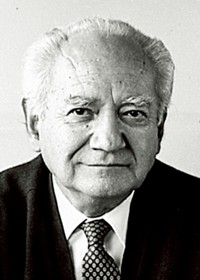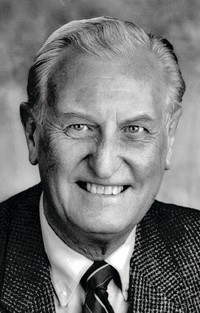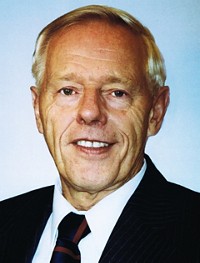Advertisement
Grab your lab coat. Let's get started
Welcome!
Welcome!
Create an account below to get 6 C&EN articles per month, receive newsletters and more - all free.
It seems this is your first time logging in online. Please enter the following information to continue.
As an ACS member you automatically get access to this site. All we need is few more details to create your reading experience.
Not you? Sign in with a different account.
Not you? Sign in with a different account.
ERROR 1
ERROR 1
ERROR 2
ERROR 2
ERROR 2
ERROR 2
ERROR 2
Password and Confirm password must match.
If you have an ACS member number, please enter it here so we can link this account to your membership. (optional)
ERROR 2
ACS values your privacy. By submitting your information, you are gaining access to C&EN and subscribing to our weekly newsletter. We use the information you provide to make your reading experience better, and we will never sell your data to third party members.
People
Obituaries
by Susan J. Ainsworth
September 10, 2007
| A version of this story appeared in
Volume 85, Issue 37
Maurice R. Barusch, 87, a retired Chevron chemist, died on July 7 of kidney cancer.
Born in Japan, Barusch grew up in San Francisco and earned his doctorate in chemistry from Stanford University in 1943. He took a job that same year at Standard Oil, which later became Chevron. Throughout his career, he developed fuel additives to improve gasoline efficiency. In 1982, he retired as vice president of Chevron Research.
In 1977, Barusch received the ACS Detroit Section's Thomas Midgley Award for his contributions to chemistry in the automotive industry.
The West Contra Costa Unified School District, in Richmond, Calif., recently honored Barusch, who worked to desegregate their schools from 1965 to 1969 as a school board member.
He is survived by his wife, Barbara Langlois; and sons, Larry and Ron. His first wife, Phyllis, died in 2003. An emeritus member, he joined ACS in 1943.
Ernst Otto Fischer, 88, a Nobel Laureate in chemistry, died on July 26 in Munich.
Born in Solln, near Munich, Fischer served in the German military, going to Poland, France, and Russia during World War II. Taking a brief study leave of absence from the military during the winter of 1942, he began to delve into chemistry at the Technical University of Munich, where his father was a professor of physics.
Later, captured by U.S. soldiers, he was held in a prisoner-of-war camp until repatriation in the fall of 1945. After helping to restore the university from bomb damage, he resumed his studies in 1946 at the Technical University of Munich, earning his doctorate in 1952. In 1955, he took a lecturer position there.
In 1957, Fischer accepted a position as professor at the University of Munich, where he was promoted to senior professor two years later. In 1964, he returned to the Technical University of Munich to serve as chair of its inorganic chemistry department. While there, Fischer shared the 1973 Nobel Prize in Chemistry with Geoffrey Wilkinson of London's Imperial College for their work, performed independently, on the chemistry of organometallic sandwich compounds.
Around this time, Fischer and his team were successfully synthesizing the first carbene and carbyne complexes, heralding a new class of metal complexes and spurring research in the field.
Marcus E. Hobbs, 98, a professor emeritus of chemistry at Duke University who played a bellwether role in the formation of North Carolina's Research Triangle Park, died on Aug., 12, the day after his birthday.
Hobbs earned all of his degrees—an A.B. in 1932, an A.M. in 1934, and a Ph.D. in chemistry in 1936—from Duke. In 1936, he also began a lifelong career in Duke's chemistry department.
He served as chairman of the chemistry department, dean of the Graduate School of Arts & Sciences, dean of the university, vice provost, and provost, as well as authoring or coauthoring more than 50 research papers. He also was a member of the troika created by the board of trustees to manage the university during an interim period before former North Carolina Gov. Terry Sanford was appointed as its president in 1970.
Duke named Hobbs a University Distinguished Service Professor in 1988 and awarded him the University Medal for Distinguished Meritorious Service in 1989.
While serving as dean of the Graduate School of Arts & Sciences, Hobbs was part of a committee that laid the groundwork for Research Triangle Park. He was a charter member of the board of governors of RTI International, a nonprofit organization and the park's first tenant. In 1987, RTI named its 15th building, a $4 million research facility, in Hobbs's honor. In 1999, the board of directors at Research Triangle Foundation presented Hobbs its Archie K. Davis Award in recognition of outstanding service to the research park.
In 1988, Hobbs was the first recipient of the Marcus Hobbs Award of the ACS North Carolina Section, which he chaired in 1946.
He is survived by his daughters, Sara Hobbs Jackson and Joan Hobbs Gray; four grandchildren; and a great-granddaughter.
An emeritus member, he joined ACS in 1937.
Makoto Kumada, 87, a polysilane chemistry pioneer and professor emeritus at Kyoto University, died on June 28 from kidney failure.
Kumada graduated with a doctorate in chemistry from Kyoto University in 1943 and went to work for Toshiba Electric. In 1950, he began his academic career as an assistant professor at newly established Osaka City University. In 1962, he moved to a position as a full professor at Kyoto University, from which he retired in 1983.
In the winter of 1953, when working in his laboratory at Osaka City University, he made a chance discovery that allowed for the production of a polysilane compound in large quantities for the first time, thereby opening doors to organopolysilane chemistry—an area he continued to pursue and develop. Kumada is also credited for helping discover modern transition-metal-catalyzed cross-coupling reactions in the early 1970s.
In 1967, Kumada was awarded the ACS Frederic Stanley Kipping Award in Silicon Chemistry, becoming the first Japanese scientist to win a national award from ACS, which he joined in 1969.
Zbigniew Raciszewski, 85, a Chemical Abstracts Service (CAS) editor, died on July 14 in Granville, Ohio.
Born in Uchanie, Poland, Raciszewski took part in the armed resistance against German occupiers during World War II in his native country. After the war, he studied at Warsaw Agricultural University.
In the early 1950s, he immigrated to Canada and performed research at the University of Saskatchewan, Saskatoon. He then moved to the U.S., earning his Ph.D. in chemistry from the University of Notre Dame.
In his early career, Raciszewski worked in Union Carbide research centers in Parma, Ohio, and South Charleston, W.Va., producing a number of scientific publications. Between 1969 and 1985, he served as a senior editor at CAS in Columbus, Ohio, contributing to the building of its chemical databases. He was a CAS employee for 19 years.
Raciszewski was fluent in five languages and studied the fine arts, especially classical music. He was a member of St. Edward the Confessor Catholic Church in Granville.
In addition to his parents, he was preceded in death by one brother and two sisters. His estate will establish the Zbigniew Raciszewski Fellowship Foundation at the University of Pennsylvania's Wharton School to provide scholarships for students from Poland.
Dmitry M. Rudkevich, 44, an associate professor of chemistry at the University of Texas, Arlington, died from cancer on Aug. 4.
Born in Ukraine, Rudkevich studied chemistry at the Institute of Organic Chemistry within the National Academy of Sciences of Ukraine, the highest state research organization in the country. Before earning his Ph.D. there in 1989, he had served as a member of the Soviet National Guard, responding to the Chernobyl nuclear accident in 1986.
In 1995, Rudkevich went on to complete a second Ph.D. in the laboratory of David N. Reinhoudt at the University of Twente, in the Netherlands. In 1996, he moved to the U.S. to work with Julius Rebek Jr., first at Massachusetts Institute of Technology and later at Scripps Research Institute in La Jolla, Calif. He was also a research assistant professor of the Skaggs Institute for Chemical Biology at Scripps from 1997 to 2001.
He then joined the department of chemistry and biochemistry at the University of Texas, Arlington, as an assistant professor; he was promoted to associate professor in 2004.
Focused on molecular recognition, application of calixarenes, and the supramolecular chemistry of gases, Rudkevich was coauthor of more than 125 scientific papers.
He is survived by his wife of 15 years, Sasha; and two sons, Dmitry Jr. and Eric. He joined ACS in 1996.
Conrad Schuerch, 88, distinguished professor emeritus at the State University of New York College of Environmental Science & Forestry, in Syracuse, died on July 15.
A native of Boston, Schuerch earned a bachelor's degree in chemistry and doctorate in organic chemistry from Massachusetts Institute of Technology in the 1940s. He also served with the U.S. Army Air Corps during World War II.
He began his career as a research associate at McGill University, Montreal, before he arrived at SUNY-ESF in 1949 as an assistant professor of forest chemistry. He was one of the founding members of the SUNY-ESF's department of chemistry and served as department chair from 1956 to 1972.??He was named distinguished professor in 1978 and retired in 1984.
Schuerch wrote more than 160 scientific papers relating to polymer, carbohydrate, and wood chemistry.??His work focused on the chemistry of lignin, the reaction of ammonia with wood, vinyl polymers with optically active centers, stereospecific polymers, the synthesis of anhydrosugars and their polymerization, and glycoside synthesis.
Schuerch was the recipient of two ACS awards—the Anselme Payen Award from ACS's Cellulose & Renewable Materials Division in 1972, and the Outstanding Chemist Award from the ACS Syracuse Section in 1973.
He is survived by one daughter, three sons, and 10 grandchildren. His wife of 55 years, Margaret Childs Pratt, predeceased him.
An emeritus member, he joined ACS in 1943.
Tore E. Timell, 86, a longtime professor at the State University of New York College of Environmental Science & Forestry, in Syracuse, died on July 11.
In 1950, Timell earned a Ph.D. in chemistry and chemical engineering from the Royal Institute of Technology, in Stockholm, the city of his birth.
In 1951, Timell began his career as a research associate at SUNY-ESF. A year later, he moved on to McGill University in Montreal, serving as a lecturer and chemist at the Pulp & Paper Research Institute. He returned to SUNY in 1962 as a professor in what is now the department of chemistry. Later, he became the director of the Cellulose Research Institute there. Throughout his career, he conducted research on cellulose, hemicellusoses, and other wood-related compounds, retiring from SUNY in 1995.
Timell was president of the International Academy of Wood Science from 1975 to 1978. He chaired numerous international conferences on wood science and published more than 200 research papers; he authored the three-volume book "Compression Wood in Gymnosperms" and more than 22 other books on wood science. He had also been editor of the journal Wood Science & Technology.
He was a visiting professor at the University of Washington in 1967 and at the Institute of General Botany at the Swiss Federal Institute of Technology in Zurich, in 1968. In 1977, he was awarded a Fulbright fellowship at the Wood Research Institute at the University of Munich.
In 1971, Timell received the Anselme Payen Award from ACS's Cellulose & Renewable Materials Division, which he chaired from 1962 to 1963. In 1996, he received the Outstanding Chemist Award from the ACS Syracuse Section.
He is survived by his wife of nearly 60 years, Anna; three daughters; and four grandchildren. An emeritus member, Timell joined ACS in 1947.
Scott E. Wood, 97, a retired professor of chemistry at Chicago's Illinois Institute of Technology (IIT), died on June 7 in El Paso, Texas.
Born in Fort Collins, Colo., Wood earned bachelor's and master's degrees from the University of Denver and a Ph.D. in chemistry in 1935 from the University of California, Berkeley. He then became a research assistant at Massachusetts Institute of Technology before moving to Yale University, where he was promoted from instructor to associate professor while working on the Manhattan Project.
Wood joined the staff at IIT in 1954 as an associate professor. He later became a full professor and assumed administrative roles within the chemistry department, including acting dean of research, acting chairman, and vice chairman until his retirement in 1980.
He coauthored two books: "Thermodynamics: An Introduction," published in 1968, and "Thermodynamics of Chemical Systems," published in 1990. He had been an associate editor of the Journal of Chemical Physics and an abstractor and section editor of Chemical Abstracts.
In 1971, Wood received the Outstanding Educator Award from the American Association for the Advancement of Science. He was a member of the American Physical Society, Sigma Xi, and ACS, which he joined in 1929. He was appointed to the Advisory Board of Higher Education for the State of Illinois and was an active community volunteer.
Advertisement
Wood was preceded in death by his wife of 65 years, Marie. He is survived by his son, Ed.
Obituaries are written by Susan J. Ainsworth. Obituary notices may be sent to s_ainsworth@acs.org and should include detailed educational and professional history.








Join the conversation
Contact the reporter
Submit a Letter to the Editor for publication
Engage with us on Twitter